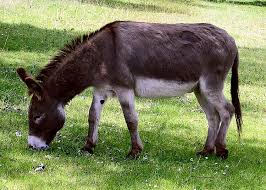中文词源
donkey 驴子
可能来自人名Duncan. 或来自dun, 暗褐色,词源同dun, 暗褐色,拼写受Monkey影响。
英语词源
- donkey
-
donkey: [18] The usual English word for ‘donkey’ from Anglo-Saxon times was ass, and donkey is not recorded until Francis Grose entered it in his Dictionary of the vulgar tonge 1785; ‘Donkey or Donkey Dick, a he or Jackass’. No one really knows where it came from. The usual explanation offered is that it was based on dun ‘brownish grey’ and the diminutive suffix -ey, with the intermediate k added in imitation of monkey (donkey originally rhymed with monkey).
=> dun - donkey (n.)
- 1785, originally slang, perhaps a diminutive from dun "dull gray-brown," the form perhaps influenced by monkey. Or possibly from a familiar form of Duncan (compare dobbin). The older English word was ass (n.1).
权威例句
- 1. He gave the donkey a whack across the back with his stick.
- 他拿棍子朝驴背上狠狠打了一下。
- 2. He gave the donkey a mighty prod in the backside.
- 他用力捅了一下驴屁股。
- 3. He threw the old cloth saddle across the donkey's back.
- 他把旧布鞍搭在驴背上。
- 4. The donkey brayed and tried to bolt.
- 这头驴嘶叫着试图脱缰而逃。
- 5. A mule is a hybrid of a male donkey and a female horse.
- 骡子是公驴和母马交配而生的杂种动物。

